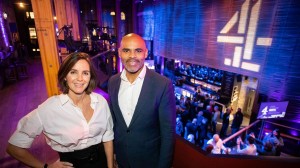West of England Metro Mayor Dan Norris has warned that government plans to privatise Channel 4 could hit Bristol’s burgeoning creative sector.
The broadcaster, which is publicly-owned but funded by advertising, opened its creative hub in Bristol last year, delivering a significant boost to the city’s media industry. 
The 3,200 sq ft creative hub in the historic Fermentation Buildings at Finzels Reach employs around 50 people and is a home for key creative decision makers supporting Channel 4’s relationships with the production sector, particularly focused on genres with strengths in the South West of England and Wales.
Commissioning departments represented in the new hub in Bristol include daytime, drama; factual and popular factual.
Creative diversity also has a presence in Bristol to help nurture and develop on and off-screen talent.
Mayor Norris said: “This proposal threatens to rip out the heart of Channel 4 – a much-loved broadcaster which has only just set down roots in the West of England.
“Channel 4’s bosses have warned that some of its programmes could be risk if it is privatised. I am extremely concerned by how this could impact people working at the Creative Hub in Bristol and those from our region’s excellent creative sector. 
“All of this is at threat of being switched off if the Government presses ahead with privatising the channel. Channel 4 also has a key role to play in promoting and encouraging diversity and much of its valuable content may not make commercial sense.
“I have written to the Secretary of State for Digital, Culture, Media & Sport, to express my grave concerns and seek assurances that this farcical idea is nipped in the bud before it causes any further harm to our creative sector, which has already suffered enough though the pandemic.”
His comments echo those of Channel 4 chief executive Alex Mahon, who visited Bristol when the city was bidding for the hub and later when it was officially opened.
Ms Mahon, pictured with Mayor of Bristol Marvin Rees at the creative hub opening party, said a change of ownership at the broadcaster could damage the government’s levelling-up agenda as it could be forced to cut its investment in regional production.
A new commercial owner would inevitably look to make a profit from the channel, meaning less money would be spent on programming and investment outside London, she argued.
“Being owned by the British people, our model puts public service before profit. We’re focused on the scale and growth of the whole industry, not any single business or bottom line,” she said.
Bristol was selected to be one of two creative hubs from more than 30 cities across the UK which pitched to become a new base for the national broadcaster. Channel 4 is also setting up a base in Leeds. Ms Mahon said plans to co-host Channel 4 News from Leeds, spend more money outside London, and nurture new British talent could be curtailed if privatisation took place.
She added: “All of that advertising money is ploughed back into the creative sector. We don’t make a profit. The profit is made by many small and medium businesses across the UK.”
John Whittingdale, the culture minister with responsibility for broadcast policy, will oversee consultation on the future of the channel, which was launched in 1983.






























